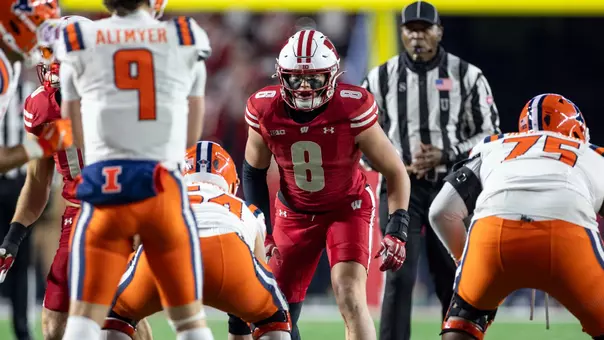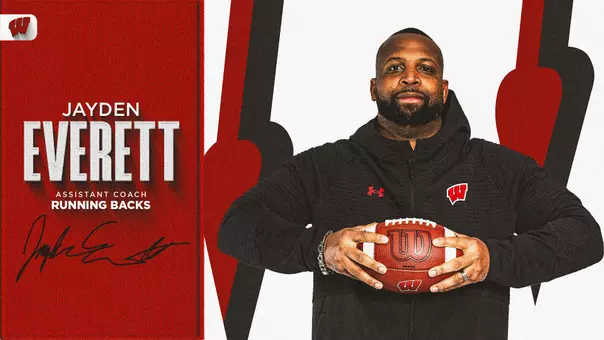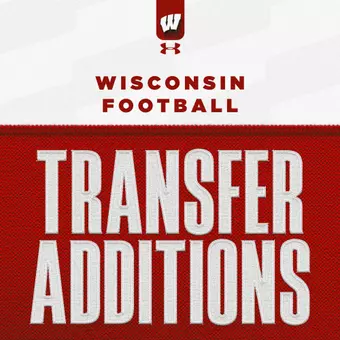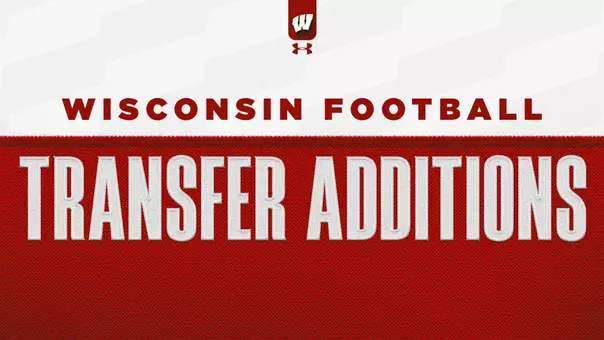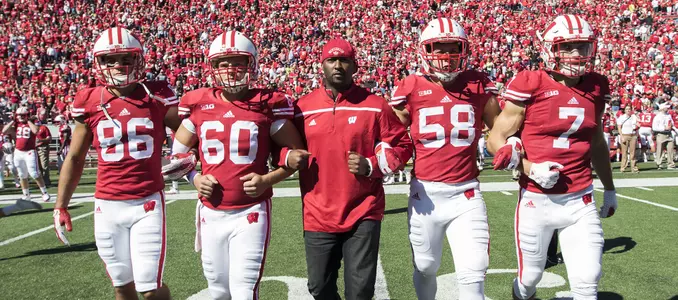
Lucas at Large: Campbell keeps learning while sharing own life lessons
May 11, 2016 | Football, Mike Lucas
Former UW, NFL safety finds fulfillment in mentoring new generation of Badgers
 |
||
|
BY MIKE LUCAS
UWBadgers.com Senior Writer
MADISON, Wis. — LaMar (Soup) Campbell has no trouble rhapsodizing about his internship with Wisconsin's Office of Student-Athlete Development since the mentoring role and give-and-take dialogue is so empowering and fulfilling for the 39-year-old former defensive back.
Some of the random one-on-one visits, he admitted, have been the most enjoyable. "When they just want to come into your office and talk about something besides sports," he said. "They want to talk about life, they want to talk about their future, they want to talk about problems they're having."
In this capacity, as a sounding board, these personal interactions never cease to put a smile on his face. It's a role and responsibility that he does not take lightly, especially given his overall loyalty to the university and athletic department and his commitment to giving something back as an alum.
"The students give me life; they keep me going, they keep me on my toes," he said. "I learn as much from them as I hope they learn from me. That's my life blood. They give me the energy to keep going and they remind me every day why I'm here."
Campbell is here to learn and teach. He's working towards his master's degree in Educational Leadership and Policy Analysis. As a part of a course practicum, he's helping develop a life skills program at UW-Whitewater. In addition, he's teaching a business entrepreneurship class at Edgewood College.
Campbell is also here to share — to share his vast and varied life experiences:
As a UW athlete who left school without his degree. As a player for the Detroit Lions. As a member of the Lions scouting department. As a contributor to CNN/HLN. As a director of media relations for the Atlanta NFLPA. As the owner of a real estate company. As the host of a radio show.
Fittingly, the show was titled Life After the Game and it aired on VoiceAmerica Sports.
"I feel like I have a lot of experience in different things, not all good experiences, but good and bad experiences," Campbell conceded. "What I bring to the table is probably what I brought to the field. I'm a Swiss Army knife kind of guy. I can fill in where necessary on a lot of issues.
"Having a W (as a four-year letterwinner), being a Badger, having the experiences I've had in life has put me in a role where I can come back and help in a lot of different ways. I'm very passionate about Wisconsin … we want to make sure we're sending our best young men and women out into the world."
On any given day when he looks across his desk at a student-athlete, Campbell says, "I see a lot of them with a lot more talent than I had, a lot more brain power, male and female. I tell them all the time, 'You're limitless, you have no ceiling. I wish I had your talent; I wish I had your academic acumen.'"
He also tells them how he was "limited" without his undergraduate degree.
"As a scout (with the Lions), I loved guys who had their degrees because I knew they took care of business," he said. "That puts you higher on the (draft) board for me because I knew you could handle anything we threw at you if you could handle being a student-athlete."
In lecturing to others on the merits of education while touring on the speaking circuit, Campbell said, "I realized that's what I was passionate about — working with young people. But I couldn't tell these kids to finish that degree when I didn't myself. That prompted me to come back to school."
Sixteen years after leaving Wisconsin to sign with the Lions, Campbell came back and completed his bachelor's degree requirements in history. In late December of 2014, he proudly walked across the stage during winter commencement. It's never too late for closure, he found, especially when it opens new doors.
"I tell these guys here all the time, 'I came back in 2014 to finish the first semester that I blew when I got here (in 1994), otherwise I would have finished in four years,'" he said.
"There are a lot of times when you're just wide-eyed; you're 17 years old on a college campus and you're going to class. But are you really digesting the information?" he posed. "You want to enjoy the college experience. Madison is a great town. In that mindset, you have to have a school and life balance."
 Since returning to the Wisconsin campus, as a student and intern, Campbell has been balancing work and family — commuting between Madison and Atlanta, where his 8-year-old son Jayden lives with his mother, Carmen. He gets home about once a month.
Since returning to the Wisconsin campus, as a student and intern, Campbell has been balancing work and family — commuting between Madison and Atlanta, where his 8-year-old son Jayden lives with his mother, Carmen. He gets home about once a month.
"I'm not big on technology but I'm in love with Skype; I get to see his face a couple of times a week," he said. "Being away is the hardest. But we have a great relationship. He understands education is important. And when I talked to her about this opportunity, she was 100 percent supportive."
Father and son have struck a deal. "That we're both going to get A's in everything that we do," he said, "while I'm in school and he's in school. It's something we take very seriously. She (Carmen) understood to have my master's would be a foundation for our boy and raising a great young man."
• • • •
Campbell was raised in a single-parent home in Chester, Pennsylvania, a Philly suburb. A lot of blue-collar role models left a positive impression, including his mom, some aunts, his grandma, the "true" matriarch of the family, he said, and his grandpa, a pipe fitter and union man who worked in the shipyard.
"The family raised you," Campbell said, "and the neighborhood also raised you."
Chester, of course, was home to former Wisconsin basketball coach Bo Ryan.
"I would say my neighborhood wasn't the best environment to be in — it was a lot different from Bo Ryan's days there," Campbell said. "When I was growing up, Chester was poverty-stricken and had one of the highest murder and crime rates in the country. We didn't have a whole lot.
"But I will say my family made sure that we didn't know that we didn't have a whole lot."
Campbell caught a break when his high school, St. James, closed because of budget cuts. That allowed him to transfer to Strath Haven in Wallingford. "It was 10 minutes from my 'hood' and night and day," he said. "They actually had books that weren't missing pages and covers."
Campbell, a track athlete, didn't get serious about football until his senior year. He had his best game against Upper Darby whose star, Floyd Wedderburn, a prep All-American, was high on everyone's recruiting list. Campbell summarily jumped on the radar of many schools, including Wisconsin.
"Coach (Barry) Alvarez was the only coach with enough moxie to actually come to my house — a lot of the other coaches would meet me at my high school," he said. "He was confident enough to come into my neighborhood and tell my family that he wanted me to become a part of his program.
"He told me that they were building something and I was going to have to work for everything."
There were no promises, and Campbell respected that out of Alvarez.
"Soup exudes so much energy and confidence – he makes you smile, he makes you feel good — I felt he'd bring personality and excitement to our football team," said Alvarez, who feels like he's ideally suited for his current role in student-athlete development. "He has a great message for the kids."
Part of that message is how to cope with adversity. During his junior spring at Wisconsin, Campbell's stepbrother was gunned down outside his home in Chester. He was 22. "I don't have many regrets in life," he said, "but I do regret not being able to afford to go home to his funeral."
His family didn't have the money for the airplane ticket. And there was no NCAA assistance fund available back then for such emergency travel. Campbell, moreover, wasn't sure what he should say about Kareem's death if anyone asked, or if he should say anything at all to the coaches.
"My half-brother was heavy into drugs," he recounted. "Do I go in and tell the coaches that my brother was murdered?
"That's why I'm so passionate now about being in student-development because I really didn't have that person to go to in a lot of ways — not because we didn't provide it, but it was a lot different. Sometimes it's important to have people who have been through those experiences."
Today, the UW Student-Athlete Development team has six staffers.
"You want to let people know that you are there for them," Campbell said, "and you won't judge them based on their issues. You actually want to help them through those issues. Having this opportunity to come back here and be a part of a university that gave me so much is very exciting."
Particularly since he doesn't want anyone to feel the same anxieties that he once did.
"I've never felt more fulfilled," he said, "than what I'm doing right now."

• • • •
Campbell has never forgotten the conversation that he had with the late Andre Waters, a hard-hitting safety that played 12 years in the NFL with the Philadelphia Eagles and Arizona Cardinals. "Being a Philly guy, I modeled a lot my game after him," Campbell said.
What he remembered most was Waters asking him, "How are you feeling?"
Why would he ask? It was out of the blue. Campbell, then 30, thought the timing was curious.
"I was feeling pretty good." he said. "I had just left the NFL and I wasn't an old man yet."
Two years later, Waters committed suicide. He was 44. His depression was linked to the onset of Chronic Traumatic Encephalopathy. Former San Diego Chargers linebacker Junior Seau and former Chicago Bears safety Dave Duerson were 43 and 50 years old, respectively, when they took their lives.
"Dave had mentored me on VoiceAmerica Sports," said Campbell, who also knew Seau.
A few years ago, Campbell signed papers to donate his brain to CTE research at the Boston University School of Medicine. "I wanted to make sure that I was honoring some of the guys who looked out after me," he said. "It was a very difficult decision, but I'll be giving back even though I'm not here."
Campbell has been proactive in terms of staying healthy with things that are controlable.
"I'm still working out," he said, "and I'm still eating right."
And he's still challenging himself every day to make himself and others better.
"If I'm not here at work," he said, "I'm not helping them (the student-athletes). And if I'm not in school, I'm not helping my son or my future."
A future, to use his own word, that seems to be limitless.

